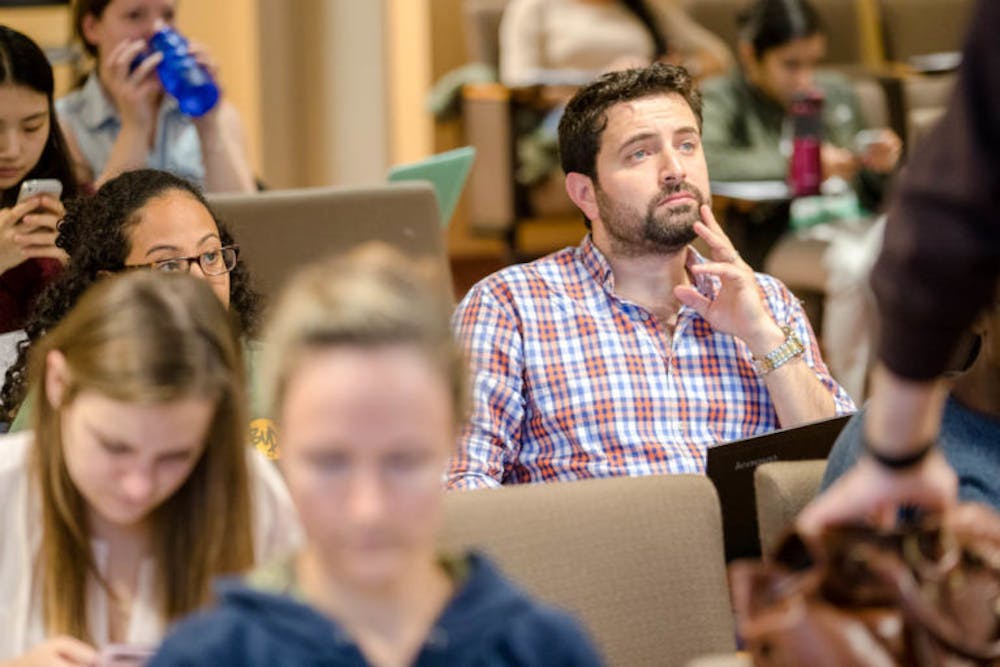Former Master’s of Public Health student Khaled Almilaji realized his vision of building an underground hospital in his home country of Syria with the help of the Watson Institute for International and Public Affairs’ Humanitarian Innovation Initiative and University student groups. The construction of the Avicenna Women and Children Underground Hospital in Idlib, Syria, was completed this past summer, and the hospital is set to be operational by the end of the year provided it secures enough funding.
Almilaji, who worked as a doctor in Aleppo, Syria, was arrested and imprisoned by the Assad regime for treating protestors in September 2011. He came to Brown to study public health in fall 2016 as part of a University initiative to bring displaced Syrian scholars to campus, but his studies were interrupted after his visa was revoked on a trip to Turkey. Almilaji waited on an American visa for around six months — the same period during which President Trump issued his executive orders on immigration — before joining the University of Toronto for a Master’s in Health Informatics at the Institute of Health Policy, Management and Evaluation.
Almilaji told The Herald from Toronto, Canada that the newly constructed hospital is intended to provide specialized care to women and children, who face a lack of specialized services in the region. Almilaji decided to build a hospital underground because the Assad regime has targeted medical facilities during the Syrian Civil War, putting patients and doctors at risk. The facility will also have a floor devoted to trauma. Almilaji said that as of now, many trauma cases “are referred to Turkey, and (patients) are unfortunately dying on the way.”
The hospital can become a field hospital at a moment’s notice. Idlib is at the center of the last rebel-held region of Syria, and large-scale fighting in the region was averted when Turkey and Russia reached a peace agreement Sept. 18. “Hopefully this will (create) a more peaceful environment, so we can keep working safely,” Almilaji said. But if Idlib is attacked, it would take “just two days to move any equipment from the other hospitals into our hospital.”
Almilaji added he is “almost sure there will be no military” action in Idlib, “but nobody knows enough to predict what will in happen.” He noted that “there are almost 3.5 million people in the region, and it would be a catastrophe if there is a military attack in the area. The people in Idlib have been displaced from area to area in Syria already. They have suffered enough.”
In the long term, Almilaji hopes to use the hospital to train the next generation of Syrian doctors. “We would bring new residents, or current residents who didn’t complete their medical training so they can be trained in this facility,” he added.
Almilaji is an Humanitarian Innovation Initiative international fellow, and his organization, the Sustainable International Medical Relief Organization, receives HI2 advisory support. HI2 organized an open challenge to help SIMRO develop a comprehensive telehealth system for the hospital, which would allow medical staff to work with specialists in the United States and would facilitate training.
SIMRO raised almost $1 million for the construction of the hospital, nearly $200,000 of which came from an online campaign spearheaded by Brown students, Almilaji said. The hospital is now transitioning from the construction phase to the operational phase, but SIMRO lacks funding to fully cover operating costs. There will need to be cooperation between local organizations and international ones to finance the hospital’s operations going forward, Almilaji said. “We are waiting for donors to send equipment so we can provide the services that we aim to,” he added.
Director of HI2 and Associate Professor of Emergency Medicine Adam Levine praised the effort, as it provides “care for some of the most vulnerable internally displaced people in all of Syria and all of the world.”
“We’ll continue to help in any way we can,” he added.
Thousands of miles from the newly constructed facility, Almilaji is currently settling into his life in Canada. He was awarded the Meritorious Service Medal, a Canadian honor given by a representative of Queen Elizabeth II.
Almilaji described Toronto as “a very nice city, a very big city, and everybody’s positive.” He is enjoying the master’s program, which he described as very competitive. He is also studying applied geographic information systems at Ryerson University to learn more about medical geography.
“A couple of days before I travelled to Canada, I received a call from the American Embassy,” telling him his visa was granted, Almilaji said. “That was so unfortunate,” Almilaji added, noting he wanted to return to the “fabulous, supportive, amazing family” waiting for him at Brown. But moving to Canada allowed him to reunite with his pregnant wife and witness the birth of his daughter, who is now just over a year old.





